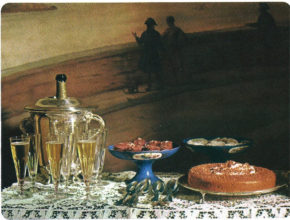In Decorum: A Practical Treatise on Etiquette and Dress of the Best American Society, (1880) the author states on the subject of leaving a dinner party or Ball: “We should retire incognito, in order not to disturb the master and mistress of the house; and we should make them, during the week, a visit of thanks, at which we may converse of the pleasure of the ball and the good selection of the company.”
Now a days, we do not leave incognito, we go over to the host and say goodbye. We also apparently, speak of ourselves in the third person.
Snobs will state that you must say goodbye no matter what. So, if you’re attending a party at a snob’s house, ask yourself why you RSVP’d and leave immediately. Though, to be fair, they are correct.
Generally, it’s polite to say goodbye, so try to do so. If the host is very busy or in the middle of a great story, wait a few minutes to see if he or she will free up, but if not, you can go. If you can’t find the host and your sitter is going to leave your kids, dog or parent, you can go. It’s nice, in these circumstances, if you know other guests to ask someone you trust to relay your goodbyes, (and excuse for leaving) to the host.
You may say goodbye to one half of a couple who are hosting a get-together. Just remember to let the one you’re telling know that you did not say goodbye to their partner.
If you are attending a very large gathering and you are not very close to the hosts, you can leave without saying goodbye if the party is still in full swing. Just remember to send a thank you note within 24 hours. Do not do this if your boss is your host or if the party is a wedding, Bar/Bat Mitzvah, Quinceanera, Debutante Ball or any other formal event. In these cases, you must say goodnight.
As for when to say your goodbyes at smaller events like dinner parties that are not formal, etiquette guides are usually pretty vague. Though Manners & Rules of Good Society By A Member of The Aristocracy, (1906) does give some guidance. “Half-past ten is the usual hour for general departure; and the butler announces the several carriages as they arrive to the guests in the drawing-room.”
Gone are the days that guests would retire to separate rooms for a half hour and then join back up for additional conversation. Also, gone are evenings where people were expected to play the piano, sing or recite poems after dinner. No one is waiting for the butler to announce their carriage. Though today, people loiter at the door waiting for their Lyft.
The best description of when to leave a formal dinner or event comes from Amy Vanderbilt’s Complete Book of Etiuquette, 1957:
“Except for some very good reason discussed previously with the hostess, no guest may leave after a formal dinner in a private home in less than two and a half to three hours and even then, not until the guest or guests of honor have departed. At formal public dinners guests who must leave early go quietly either before the speeches begin or between them, never while a guest of honor is speaking for while a national anthem is being played. Those who must leave, leave by the nearest exit without stopping to talk or bid farewell to guests encountered en route, except to bow briefly.”
Now-A-Days, I’d say, a half hour after the meal has ended and you’re allowed to leave. Otherwise, you have to play it by ear. If the dinner was short, you have to stay a little longer. If there is a guest of honor and the guest of honor leaves, you can go as well. If your boss is at the event, you should wait to leave after your boss.
Lillian Eichler in Book of Etiquette, (1922) says, “In taking leave of the hostess, it is necessary to thank her cordially. Criticisms, either of the conduct of some other guest, or of servants, are poor form and should be avoided. The ideal guest is the one who has that ease and poise of manner that calmness and kindness of temper, that loving and lovable disposition that makes people somehow want to talk and be with him,”
Now that is good advice, it is unlikely that a host doesn’t realize which guests have been too drunk or loud and will remember them when making out their invitations to the next shindig. What a tired host needs to hear is what went right. Stick to that and you’ll get invited back.
Snobby note: snobs will say that all post-party notes should be written on paper and mailed. If this is a regular party, you can email. I just ask that you do not text unless it’s a rager with your high school or college friends. If it is a formal event, I do try to send a real note on real paper. But in a day and age where people send wedding invitations by email, you can respond in kind.
Hoping you’re well and happy. Much love, Cheri


